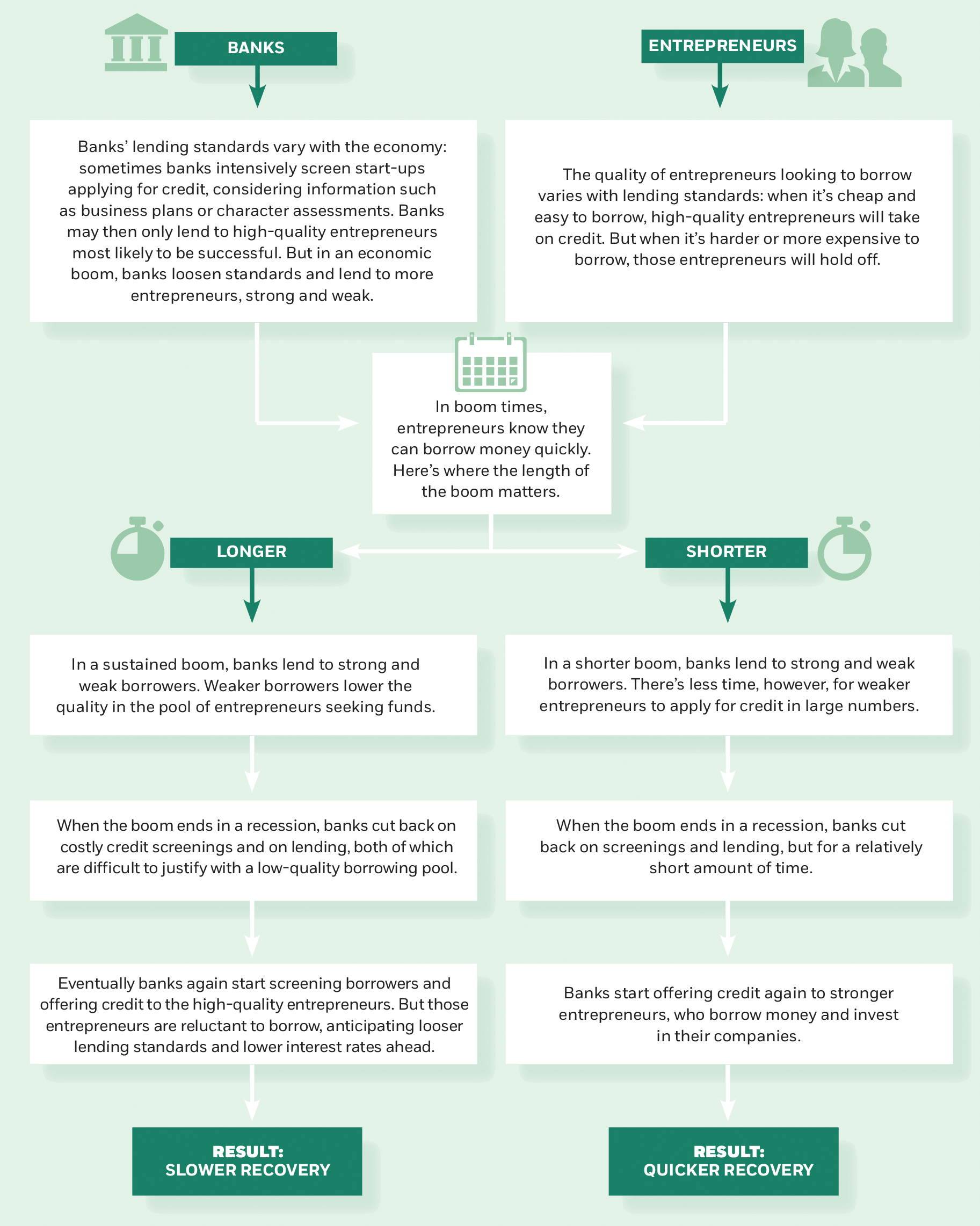
Algorithms and AI Can Make Hiring More Diverse
The cost is likely minimal to achieve a fairer outcome.
Algorithms and AI Can Make Hiring More DiverseWhen an economic boom ends with a recession—as it did when the real-estate bubble popped—business leaders and policy makers would like to know how long it will take for the economy to recover. The trajectory of the recovery depends on the length of the preceding economic boom, according to research by Chicago Booth PhD candidate Yunzhi Hu: each additional year of an economic boom delays the recovery that follows by about two-and-a-half months, the data suggest.
The trajectory has to do with a dance of sorts between banks and entrepreneurs, as banks’ lending enables young companies to grow and fuel the economy. Hu constructed a model that illustrates this interplay.
The dance starts with banks, whose lending standards vary with economic conditions. In stable economic times, banks typically extend credit readily to high-quality entrepreneurs running start-ups and young businesses. Banks lend to this group after doing a credit screening that can be costly and intensive, involving business plans and character assessments.
How long will it take?
Each additional year of an economic boom delays the recovery that follows by about two-and-a-half months, the data suggest.

As the economy booms, however, banks loosen up their lending standards. They do less screening and lend to more entrepreneurs, both strong and weak. But when the boom ends and recession hits, banks pull back steeply on screenings and lending. Reluctant to lend to any entrepreneur, they slow or even stop lending until confident they can again locate and lend to only strong borrowers.
This is similar to the dynamics of the mortgage market during and after the US real-estate boom. Banks were eager to lend to all sorts of borrowers during the boom, but temporarily stopped lending after the crash, then tiptoed back into the mortgage market, avoiding subprime borrowers.
But just as the economic cycle affects banks’ lending standards, those lending standards affect how entrepreneurs behave. In boom times, entrepreneurs can borrow money quickly. Here’s where the length of the boom matters: after a short boom, the entrepreneurs seeking to borrow money are still relatively strong. But the longer an economy booms, the more banks see weaker entrepreneurs looking for credit. And when a long boom ends, the pool of prospective borrowers is full of those weaker entrepreneurs. When recession hits, entrepreneurs may be temporarily unable to borrow.
Entrepreneurs can do other things besides run businesses. They can take a job, or go back to school. So even when banks start offering loans again, strong entrepreneurs who suspect that banks are doing so at high interest rates, because they see a sea of weak entrepreneurs, will be reluctant to borrow money. They will hold off until they’re confident they can once again borrow money quickly and cheaply. “Recoveries are slower when high-quality borrowers postpone their investments,” Hu writes.
Hu finds that the dynamics illustrated by his model are consistent with some evidence from country- and industry-level GDP data, as well as data measuring bank-screening efforts. During the Great Recession, young firms and small businesses were hit hard and have been slower to recover, Hu says. And because these companies account for half of new jobs created in the United States, “their weak performance directly contributes to the slow recovery.”
Yunzhi Hu, “Recovery Dynamics: An Explanation from Bank Screening and Entrepreneur Entry,” Working paper, November 2016.

The cost is likely minimal to achieve a fairer outcome.
Algorithms and AI Can Make Hiring More Diverse
Chicago Booth’s Sam Peltzman discusses his research on the factors associated with greater happiness.
Is Money or Marriage the Key to Happiness?
The decisions of companies, governments, and educators will help to shape the ultimate outcomes of the A.I. revolution.
A.I. Is Going to Disrupt the Labor Market. It Doesn’t Have to Destroy It.Your Privacy
We want to demonstrate our commitment to your privacy. Please review Chicago Booth's privacy notice, which provides information explaining how and why we collect particular information when you visit our website.